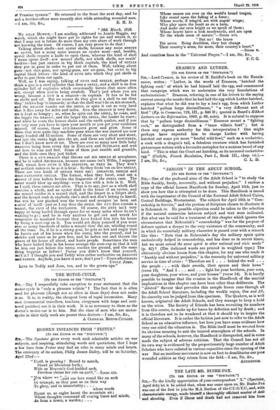ERASMUS AND LUTHER.
[To THE EDITOR OP THE " SPECTATOR:1
SER,—Lord Cromer, in his review of M. Batiffol's book on the Renais- sance, writes : "Luther, in the words of Erasmus, 'hatched the fighting cock' of which he had himself laid the egg, and commenced that campaign which was to undermine the very foundations of ecclesiasticism." Erasmus, referring in one of his letter i to the saying current among the monks that he had laid the egg which Luther hatched, explains that what he did was to lay a hen's egg, from which Luther hatched " pullum lenge dissimillimum," "a very different sort of bird" (Rp. to Caesarius, 719, HI., p. 840 D; quoted in Beard's Ribbed Lectures on the Reformation, 1883, p. 69, note). It is natural to suppose that by " pullum longe dissimillimum " Erasmus meant a "fighting cock," as distinguished from a "tame villatic fowl" ; but is there any express authority for this interpretation ? One might perhaps have expected him to charge Luther with having hatched out some yet more "fearful wild-fowl," such as a cockatrice. a cock with a dragon's tail, a fabulous creature which has furnished picturesque writers with a favourite metaphor for a noxious brood of any kind. "This is what the Court sat hatching, as its accursed cockatrice- egg " (Carlyle, French Revolution, Part L, Book HI., chap. vii.).—


























 Previous page
Previous page